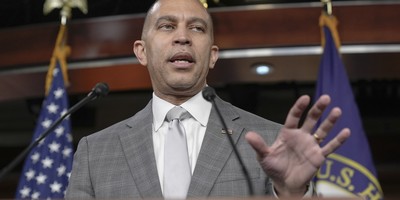A few days after the election of 2012 the very talented Michael Ramirez published a political cartoon that perhaps conveyed a more profound meaning than he anticipated. He depicted a pair of hands extending from star-studded sleeves (presumably from a mendicant Uncle Sam), which were held in supplication, as though waiting for a handout or petitioning voters to relinquish more of their earnings to the federal government. There’s another way of interpreting this image, however; the hands appeared not only pathetic and a bit contemptible, but also aged and withered, as though belonging to an old man. In which case, this representation captured perfectly the situation of the United States as it enters the second decade of the 21st century: America is getting older and is entering a state of decline.
No one understood the dynamics of aging societies approaching decrepitude better than Mancur Olson, an economist who taught at the University of Maryland until his death in 1998. Olson’s crowning achievement was a book published in 1982 titled, “The Rise and Decline of Nations.” Olson argued that the proliferation of interest groups (collusions or distributional coalitions, in his terms) eventually spells doom for the societies they inhabit. And proliferate they have, from 6,000 in 1959 to 22,000 at the beginning of the 21st century, according to the Encyclopedia of Associations. Like it or not, every man, woman, and child in the country is represented by an interest group.
But when we say “interest group,” what exactly do we mean? America’s master political thinker, James Madison, said it best with his definition of “faction” in Federalist 10, as comprising “a number of citizens, whether amounting to a minority or majority of the whole, who are united and actuated by some common impulse of passion, or of interest, adverse to the rights of other citizens, or to the permanent and aggregate interests of the community” (italics added). So much for our contemporary, naïve notions about how factions (interest groups) proclaim to represent some greater good.
It gets worse, especially considering three additional developments. First, America’s mammoth federal government constitutes an interest group itself, which means it does all the things other public and private groups do to protect itself. Second, about half of the population receives some form of aid from the federal government, according to the Heritage Foundation’s 2012 Index of Dependence on Government, and these recipients constitute perhaps the most behemoth group of them all. Third, close to one-half of the entire population does not pay federal-income taxes, a figure that climbed from 12 percent in 1969 to 34.1 percent at the beginning of the Bush administration to its current figure as President Obama starts his second term. The question is: What does all this mean for the destiny of America?
Recommended
Prepare yourself for some very bad news. As societies age, they “tend to accumulate more collusions and organizations for collective action over time,” which in normal speak means that societies become infested with interest groups just like arteries become more rigid and clogged with body gunk as you get older—a phenomenon Jonathan Rauch referred to as “Demosclerosis.” Further, groups “reduce efficiency and aggregate income in the societies in which they operate and make political life more divisive.” Example: anyone read the healthcare bill lately? And the thousands of regulations in existence and forthcoming? And consider its huge increased costs?
The keystone of this argument is a passage that is terrifying in its implications and is worth quoting in full: “The typical organization for collective action [interest group] within a society will … have little or no incentive to make any significant sacrifices in the interest of the society” and “there is ... no constraint on the social cost such an organization will find it expedient to impose on the society in the course of obtaining a larger share of the social output for itself” (italics in original). This means nothing less than it says: a group will kill its host, the American republic in this case, before relinquishing even a modicum of benefits for itself.
Nations die this way, empires collapse, societies atrophy, and countries implode (like the old USSR) or are conquered from without. In the United States, this phenomenon cannot be blamed exclusively on Democrats or Republicans; both parties represent coalitions of groups that all want something from the government. Indeed, if there is any difference between Republicans and Democrats in this regard it is that President Obama has accelerated this process over the last four years. But institutionalized selfishness was a going concern before he came along.
All of which is suicidal, right? Yes, it is. Can anything be done to arrest or reverse this process? Absent some kind of revolutionary demolishing of governmental interventions, no, there probably is not. What, then, might happen to America? Considering the current economic situation, some kind of collapse is of course possible. Most likely the United States will change into something else, into a “soft” totalitarian society envisioned by Alexis de Tocqueville, where its citizens are “cared for” but weighted down by mountains of rules and bereft of any dynamism, creativity, or imagination—subservient, socialist, and senile.
And we will have no one to blame for the fall of our country but ourselves.

























Join the conversation as a VIP Member